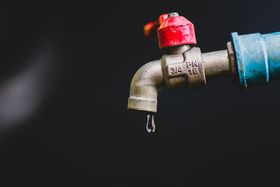Dehydration During Pregnancy: Recognize the Signs and Stay Safe
Think you're drinking enough water for two? Pregnancy dramatically changes your hydration needs. Do you know if you're truly staying safe from dehydration?
Updated March 13, 2025

Pregnancy means constant thirst. Is it normal or a warning sign? It's easy to dismiss it as another pregnancy symptom.
But that thirst could signal dehydration, a serious risk. It's not just discomfort; dehydration can zap your energy, cause headaches, and even impact your baby. Are you sure you know the difference between normal pregnancy thirst and a dehydration warning? Are you overlooking something crucial?
Don't guess! Learn the key signs of dehydration beyond just thirst. We'll give you simple tips to stay safely hydrated, protecting both you and your baby. Take control and ensure a healthier, more comfortable pregnancy.
» Prevent dehydration during pregnancy using a 3-step process
Symptoms and Complications: What Happens If a Pregnant Woman Becomes Dehydrated?
Dehydration during pregnancy is a serious issue that can impact both mother and baby. Understanding the short—and long-term risks is crucial.
Short-Term Risks:
- Headaches, Dizziness, and Fatigue: Dehydration can lead to reduced blood volume, which can cause headaches, dizziness, and fatigue. These are common pregnancy complaints, but if they're persistent or worsen, especially alongside other symptoms, it's a red flag.
- Dry Mouth and Constipation: Dehydration directly affects saliva production, leading to a dry mouth. It can also exacerbate constipation, a common pregnancy discomfort, as water is needed for proper digestion.
- Cognitive Problems: Even mild dehydration can impair cognitive function, affecting memory, focus, and decision-making. This can be particularly concerning during pregnancy when mental clarity is important.
- Maternal Overheating: Proper hydration is essential for regulating body temperature. When dehydrated, the body struggles to cool itself, increasing the risk of overheating, which can be dangerous for the developing baby.
Long-Term Risks:
- Neural Tube Defects: Adequate hydration is crucial during the first trimester for proper fetal development, including the formation of the neural tube. Dehydration can increase the risk of neural tube defects [1].
- Low Amniotic Fluid: Amniotic fluid is essential for protecting the baby and allowing for proper development. Dehydration can reduce amniotic fluid levels, which can lead to complications.
- Preterm Labor: Dehydration can increase the risk of preterm labor, as it can trigger contractions. This is a serious complication that can lead to premature birth [2].
- Birth Defects: While the exact mechanisms are still being studied, some research suggests a link between dehydration during pregnancy and an increased risk of certain birth defects [2].
» Check out the best types of water for dehydration
Dehydration, Preterm Labor, and Braxton Hicks Contractions
Dehydration can contribute to preterm labor and Braxton Hicks contractions by putting stress on the fetus. This stress can trigger the release of hormones that stimulate contractions. Essentially, the body may react to dehydration as if it were under stress, potentially leading to premature labor.
These conditions are more likely when a pregnant woman is also very active, has a full bladder, or after sexual activity, as these situations can further contribute to dehydration or uterine activity.
» Find out how dehydration causes shortness of breath
Dehydration and Pregnancy-Related Conditions
Dehydration plays a significant role in several pregnancy-related conditions:
- Hyperemesis Gravidarum: Severe vomiting, a hallmark of hyperemesis gravidarum, can quickly lead to dehydration. The cycle of vomiting and dehydration can be difficult to break [3].
- Urinary Tract Infections (UTIs): Dehydration can increase the risk of UTIs by concentrating urine, which makes it easier for bacteria to grow. UTIs during pregnancy can lead to serious complications [4].
- Dizziness and Fainting: Dehydration can cause dizziness and fainting due to decreased blood volume and blood pressure. This increases the risk of falls, which can be dangerous for both mother and baby.
» Check out the best water to drink for cellular hydration
Dehydration, Labor, and Delivery
Dehydration can make labor more difficult and increase the risk of complications. One study suggests a link between maternal hydration and infant birth weight, length, head circumference, and chest circumference [2].
Dehydration can also increase the risk of gestational diabetes, which carries risks like macrosomia (large baby), stillbirth, and preterm labor. Even without gestational diabetes, dehydration alone can cause preterm labor.
» Learn to rehydrate after vomiting
Vulnerable Groups
Pregnant women with certain conditions are more vulnerable to the dangers of dehydration:
- Gestational Diabetes: Women with gestational diabetes are at increased risk of dehydration due to increased urination caused by high blood sugar levels. The kidneys work overtime to filter excess glucose, leading to fluid loss [5].
- Preeclampsia: Women with preeclampsia may experience fluid shifts and reduced urine output, which can mask the signs of dehydration. Swelling, a common symptom of preeclampsia, can also make it difficult to assess hydration status [6].
» Find out how you can delay skin aging with hydration
How Much H2O Should a Mama-to-Be Aim For?
The American College of Obstetricians and Gynecologists (ACOG) suggests pregnant women aim for eight to twelve cups of fluids daily. Water isn't just quenching your thirst; it's a vital part of building a healthy baby.
It helps deliver nutrients, flush out waste, and even forms the amniotic fluid that cushions your little one. Plus, staying hydrated can ease some of those pesky pregnancy discomforts, like constipation.
The American Medical Research Institute also recommends around 2700 mL, which is roughly 11 cups.
» Check out the best electrolytes for breastfeeding
What Kind of Water is Best?
Now, let's explore the kinds of water you should be reaching for:
- Filtered Water: This is a big one. Filtered water helps remove potentially harmful stuff, like PFAS and excess fluoride, which could negatively impact fetal development. You want to give your baby the best start possible, right?
- Electrolyte-Enhanced Water: This is where things get interesting. Electrolytes play a huge role in keeping your body balanced. During pregnancy, electrolyte imbalances can increase the risk of issues like high blood pressure and preeclampsia. So, adding electrolytes to your water could be a smart move.
The MAYU Full Cycle System helps remove potentially harmful substances like PFAS and excess fluoride from your drinking water, which could negatively impact fetal development.
During pregnancy, maintaining electrolyte balance is more important than ever. Electrolytes play a vital role in keeping your body balanced and reducing risks associated with high blood pressure or preeclampsia.
By enhancing your water with electrolytes using systems like MAYU Full Cycle, you can ensure that both you and your baby stay healthy throughout this critical period. Take control of your health today by investing in electrolyte-enhanced water.
Staying Hydrated is a Win-Win
So, there you have it! Staying hydrated during pregnancy is a big deal, and knowing what to drink and eat can make all the difference. It's not just about quenching your thirst; it's about supporting your growing baby and keeping yourself feeling your best.
Remember, every pregnancy is unique, so chat with your doctor or healthcare provider about any specific questions or concerns you might have. They're your best resource for personalized advice.
Here's to a happy, healthy, and hydrated pregnancy!
» Stay hydrated throughout your pregnancy using a 3-step cycle
References:
- D. A. Raines and D. B. Cooper, “Braxton hicks contractions,” StatPearls - NCBI Bookshelf, Aug. 08, 2023. Available: https://ncbi.nlm.nih.gov/books/NBK470546/
- “Associations between hydration state and pregnancy complications, maternal-infant outcomes: protocol of a prospective observational cohort study,” BMC Pregnancy Childbirth, Available: https://pubmed.ncbi.nlm.nih.gov/32033597/
- “Effect of dehydration during pregnancy on birth weight and length in West Jakarta,” Journal of Nutritional Science. Available: https://pmc.ncbi.nlm.nih.gov/articles/PMC8411261/
- “Urinary tract infections in pregnant individuals,” ACOG. Available: https://www.acog.org/clinical/clinical-guidance/clinical-consensus/articles/2023/08/urinary-tract-infections-in-pregnant-individuals
- V. Higuera, “What to know about diabetes and dehydration,” Healthline, Mar. 28, 2024. Available: https://www.healthline.com/health/diabetes/diabetes-and-dehydration
- “Preeclampsia - Symptoms & causes - Mayo Clinic,” Mayo Clinic, Apr. 15, 2022. Available: https://www.mayoclinic.org/diseases-conditions/preeclampsia/symptoms-causes/syc-20355745
Disclaimer: The information published by Mayu Water is not a substitute for the expert knowledge, advice, and recommendations of trained professionals. We strongly recommend consulting with industry experts and primary or scientific sources before making any health, research-related, or other important decisions.













































